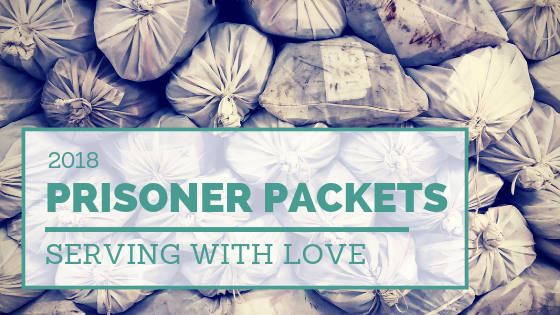Christmas Packets Could Launch Year-Round Prison Ministry
South Carolina Baptists and their ministry partners ensured that every inmate in the state received a Christmas packet this year. In all, 24,514 packets were collected for the Department of Corrections facilities, including the Department of Juvenile Justice, that included basic personal items and materials sharing the hope of the gospel.
About 140 volunteers and 30 inmates helped to process the packets on Dec. 3 at St. Andrews Baptist in Columbia. Former inmate Edwin Lopez, member of Jesus el Rey Church in Greenville, says the Christmas packet meant even more to him after he served at a collection prior to his release.
“2013 was my first year being at the collection day, and it meant so much to experience the love and joy of the volunteers. Now I feel the same joy, and it is great to help here again. The packets spread God’s love and let inmates know they are loved,” Lopez says.
One current inmate was grateful to be a part of the collection, and says he appreciates the ongoing support he receives from those who minister inside the prison walls. He serves as an usher through the chaplain’s office and takes part in other volunteer-led ministries including Bible studies, arts classes, and rehabilitation skill groups.
“Some see us as outcasts, but it’s a blessing to share time with the general community and see that they really care. When inmates see that random act of kindness and sincerity they open up, and that gives an opportunity to share Christ,” he says.
According to Jon Jamison, SERVE team strategist with the South Carolina Baptist Convention, the Christmas packet project is a powerful reminder to individuals and churches that the prison population needs relationships, encouragement, and resources throughout the year.
“I celebrate that churches have joined together for more than 40 years to provide Christmas packets to prisoners. Like helping at a food pantry or soup kitchen, we know that prisoners are in need year-round. In everything we do, we are working toward relationship and ongoing community. I encourage individuals and churches to use prisoner packets as a springboard to be engaged in prison ministry throughout the year,” says Jamison.
Chaplain Steven Hendricks, of the Broad River Correctional Institute in Columbia, sees volunteers serve his inmates through a variety of ministries, including music lessons, religious education classes, money management, and parenting skills.
“If you love something and do it well, someone inside the institution might learn to love it, too. If you can get past the fear of a door clinking behind you, then you might just discover a heart for prison ministry,” Hendricks says.
Jamison is ready to connect individuals and churches to ministry opportunities at institutions closest to them and adds that, in addition to forming relationships with inmates, the chaplains and correctional officers also need recognition and encouragement. Jamison’s team can also connect volunteers with JumpStart, an intentional 40-week discipleship program for inmates that leads up to their release and follows them through the first year back in the community.
Cary Sanders is the inside coordinator for JumpStart, which operates out of Spartanburg. Trained volunteers from across the state serve as small group facilitators in the weekly classes that are currently held in 16 of the 22 state prisons. Released inmates who have successfully completed the program while incarcerated continue to receive one year of support from JumpStart for housing, medical, transportation, employment, emotional, and mental needs. But their greatest support comes from relationships.
“Participants are appreciative that volunteers take time to help them navigate what it means to live for Christ while they’re incarcerated and upon release,” says Sanders.
JumpStart recognizes the role that churches can play in the ongoing support of inmates, during and after their incarceration period. Prison ministry should include sharing the gospel through relationships and provide discipleship opportunities for church members and inmates. Citing research showing that 95 percent of those incarcerated will be released, Sanders says churches can build a bridge for individuals to become productive citizens again.
“A lot of prisoners met Christ at their worst stage in life, received Christ, but then face little or no opportunities for discipleship. JumpStart shares the gospel then teaches that you can’t just say you’re a Christian, you have to live it,” Sanders says.
Whether working side-by-side to assemble Christmas packets or “behind the fence,” Jamison says prison ministry is a demonstration of God’s love for everyone and a picture of true community.
“I believe His love is just as fierce for people who are locked up, as it is for someone who has never stepped foot in a prison facility. For me, the evidence of my faith is that I’m walking with the Father wherever He chooses to go, and that includes going to the vulnerable and marginalized who have no standing in our community that we have pushed to the edges. Loving, encouraging, and demonstrating God’s love for them in tangible ways make me feel that I’m responding to the heart of God,” he says.
To connect with prison ministry opportunities, including JumpStart, contact Jamison at 803.227.6006 or by email at jonjamison@scbaptist.org. For more information about upcoming JumpStart training in Feb. 2019, email Sanders at cary@jumpstartvision.org.




